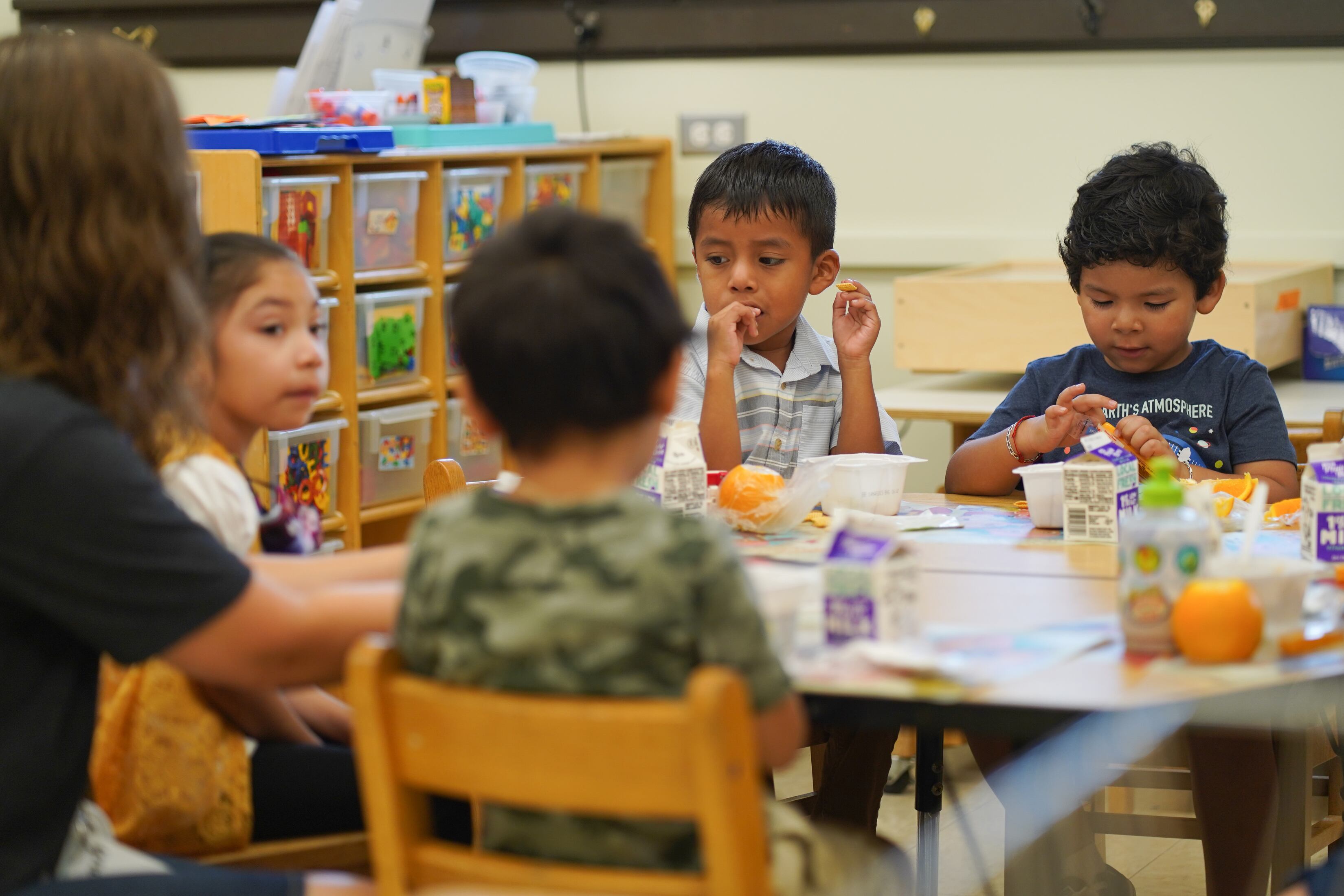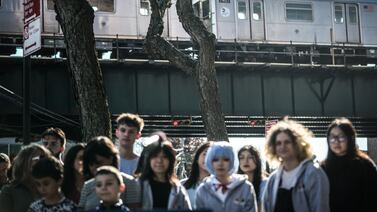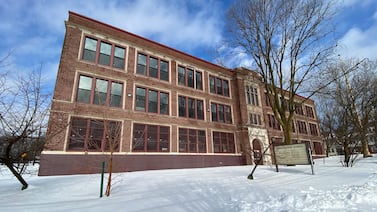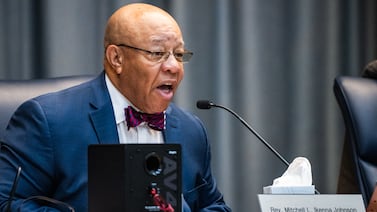Public preschool has been a lifeline for Kristen Larson.
Larson and her husband couldn’t afford private day care for both their daughters, who are 4 and 1. So last fall, when Larson was able to get a preschool seat just four blocks from their Bridgeport home for her 4-year-old, she was relieved.
Without that, she said, “I probably would have had to quit my job.”
Thousands of Chicago parents like Larson depend on the district’s free public preschool program, which has been expanding over the past five years. This year, the district has 16,062 full-day seats for 4-year-olds and another 7,300 half-day seats for both 3- and 4-year-olds, a spokesperson said. That expansion was possible in part because of tens of millions of dollars in temporary federal COVID relief money, according to data obtained by Chalkbeat through a Freedom of Information Act request.
But the federal relief funds will run out next school year, raising a critical question: How will the district continue funding universal preschool?
Since July 1, 2020, Chicago Public Schools had spent close to $700 million on pre-K programs through the end of last school year, including new summer initiatives and programs for children under the age of 3, according to district budget records. It has budgeted another $262.7 million for this fiscal year, which covers the current school year. Of all of that funding, COVID relief dollars have so far covered about 14% of those costs, or $137 million, most of which went toward employee salaries, according to expense data obtained by Chalkbeat through an open records request.
Chicago is slated to receive a total $2.8 billion in Elementary and Secondary School Emergency Relief Fund, or ESSER, dollars which districts could use broadly to help students and schools recover from the pandemic, and had spent $2.4 billion as of mid-November. The district has used the bulk of the money to fund existing costs, such as employee salaries. It has also launched new programs, such as TutorCorps, expanded summer school, and purchased new technology.
CPS officials said it used federal dollars to help expand pre-K — and sustain it — because it didn’t have enough state funding to do so, and creating more seats was a district priority.
Studies have found that kids who attended preschool are more likely to have higher test scores, were less likely to be disciplined, have better employment outcomes, and are less likely to be involved with crime.
CPS has steadily reduced its reliance on COVID relief dollars for pre-K over the past four years, increasing spending of district dollars on early childhood programs by $6 million this year, officials said. And observers are expecting the state to increase funding for early childhood education. Last week the Illinois State Board of Education proposed a budget that would increase the state’s Early Childhood Block Grant – which helps cover the district’s pre-K program – by $75 million.
But as federal funds dry up, the district is grappling with how to avoid cuts while also plugging a projected $391 million budget deficit next fiscal year, which begins July 1. That includes figuring out how to cover the cost of pre-K with local or more state dollars.
Asked if the district is considering cutting pre-K seats or laying off teachers in order to save money, district officials said they were not ready to comment on that. But neither is their first choice; the district is pushing the state for more money.
“Chicago Public Schools is committed to ensuring that every 4-year-old in Chicago has the opportunity to attend free preschool to develop valuable academic and social-emotional skills and experiences,” said Sylvia Barragan, a spokesperson for the district, in a statement.
Preschool expansion plan predates pandemic
In 2018, then-Mayor Rahm Emanuel pledged to open a pre-K seat for every 4-year-old in Chicago before announcing he would not seek a third term. It would mean big shifts for the city’s preschool system, which included a mix of half- and full-day programs at public schools and in community-based programs that served 3- and 4-year-olds.
Emanuel’s promise was picked up by his successor, former Mayor Lori Lightfoot, who set a goal to make pre-K for 4-year-olds universal by this year.
Since 2019, CPS has added 1,950 new preschool spots, district officials said.
But even as the district has expanded pre-K, enrollment has been fluctuating amid the COVID pandemic and as Chicago continues to see birth rates decline.
Enrollment initially grew – from 12,900 4-year-olds in the 2018-19 school year to 14,300 the fall before the pandemic – and then plummeted by 34%, to about 9,500 students in the 2020-21 school year.
This school year, just over 13,000 4-year-olds were in pre-K at CPS schools.
The district has reached universal demand in nearly all Chicago communities, said Leslie McKinily, the district’s chief of early childhood education.
As of September, when the district officially counted enrollment, 75% of all pre-K seats were filled, according to the district. That has grown to 81% as of last week, McKinily said. The district’s goal is 85% because officials want to have spots available for new families throughout the year, McKinily said.
CPS does not have plans to open more pre-K spots, but McKinily’s team is looking to see where they need to “right-size.” For example, she said, the city has not met the demand for pre-K seats in the North Side neighborhood of West Ridge. But there are other parts of the city where pre-K seats are going unfilled.
“We’re really thinking about right now, do we have our programs in the right spaces? And how do we ensure that the programming meets the needs of the community?” McKinily said.
Chicago shrinks reliance on federal COVID dollars for pre-K
Over the past four years, pre-K instruction accounted for the third largest use of the district’s COVID relief dollars, behind reducing class sizes for grades K-3 and spending on administrative costs related to federal relief funding, according to the data obtained by Chalkbeat.
Nearly all of the spending of COVID relief dollars on pre-K – about $130 million – went towards employee salaries, pensions, and benefits, according to the data. When looking at all expenses related to pre-K, including separate line items for pre-K students with disabilities, the district spent a total $137 million in the relief funds.
Pre-K programs in Chicago are mostly funded through state dollars as part of Illinois’ Early Childhood Block Grant. The program is also funded by some local taxpayer dollars and other federal money unrelated to COVID relief funding.
District officials said a portion of the federal COVID recovery money went toward early childhood programs outside of the regular school day, including a new summer program called Preview to Pre-K.
A spokesperson provided an additional breakdown of budget figures to show how much was being spent directly on daily preschool instruction during the school year. It showed the district spent nearly $590 million from the fall of 2020 through the 2022-23 school year and about 13% came from ESSER dollars, according to CPS. In that time period, state funding grew by just $3 million.
The data show the district has cut down on its use of ESSER funding in that time period while boosting local dollars.
Theresa Hawley, executive director of the Center for Early Learning Funding Equity at Northern Illinois University who previously worked on early childhood education initiatives in Gov. J.B. Pritzker’s administration, said Chicago officials assumed “with decent enough reason” before the pandemic that the state would pump more money into the block grant and allow them to continue opening more pre-K seats.
Pritzker is a longtime champion of early childhood education and has promised to make universal preschool more accessible across Illinois.
But in 2020, the pandemic put “a wrench in that plan” when Pritzker decided not to increase block grant funding, Hawley said. Illinois, as well as state governments across the country, worried about how the public health crisis would impact local resources as the economy slowed down.
When the federal government sent billions of COVID relief dollars to school districts, CPS decided to spend a chunk of its share to expand pre-K in absence of more state dollars, district officials said. Officials continued to invest in expansion efforts even after enrollment dropped in 2020.
“We did monitor and adjust our enrollment expansion throughout the pandemic,” McKinily said.
Still, district officials said that pre-K expansion was one of several priorities that “couldn’t wait.” The federal dollars have also helped CPS pay for existing pre-K costs, staving off budget deficits.
As the district used federal funds on pre-K in recent years, one Logan Square mother enrolled both of her sons in preschool at their neighborhood school. The program saved the family from shelling out tens of thousands of dollars in day care costs, said the mother, whose name Chalkbeat is withholding because of concerns over immigration status.
She’s currently seeing pre-K’s impact on her younger son, who is 4. For example, he used to try to snatch toys from his older brother because he couldn’t wait to play with them. But after learning how to take turns in pre-K, her son now says to his brother, “When you’re done, can I play with it?”
The mother was surprised to learn that the district used emergency funding toward pre-K. But she thinks it was the right decision.
“They have to allocate money to keep the program going,” she said, saying she is concerned about what will happen if the district can’t find extra money.
“Day care is very expensive in Chicago, and I see how important it is to have early childhood education,” she said. “And if it’s only available to people who can afford to send your child to fee-based preschool, then it’s not equitable to children.”
What lies ahead for pre-K?
Fiscal watchdogs have warned districts against using temporary federal dollars for a program they want to keep permanently, such as pre-K. Doing so can result in painful cuts that can affect children and families, so such spending decisions should come alongside lots of planning for the future, said Joe Ferguson, Chicago’s former inspector general who is now the executive director of Civic Federation, a nonpartisan government watchdog group.
“Obviously, no one’s going to say pre-K education [or] early childhood support is not an important priority,” Ferguson said. “But if it’s an important priority, then the work should have been done already – certainly needs to be done now – to identify where the revenue stream is going to come [from] to maintain it.”
Chicago isn’t alone. In New York City, former Mayor Bill de Blasio used COVID relief funds to expand his signature universal pre-K program for 3-year-olds without a plan for how to pay for those seats once the federal funds ran out. His successor, Mayor Eric Adams, halted the program’s expansion and recently proposed slashing $170 million in early childhood programming, which includes preschool for 3- and 4-year-olds.
Chicago Mayor Brandon Johnson has signaled an opposite approach, saying on the campaign trail that he wanted “child care for all” and would lobby Pritzker to increase early childhood education funding.
Last year, Pritzker proposed a four-year plan that aims to expand early childhood.
The state increased the Early Childhood Block Grant this year by $75 million, of which nearly $28 million went straight to Chicago Public Schools, as required by state law. Pritzker has not yet proposed a budget for next fiscal year, but the Illinois State Board of Education is proposing another $75 million increase.
District officials have said that more state funding for K-12 would also help. CPS, like other districts, is on a ramp toward “adequate” state funding and is $1.4 billion short of that goal, according to the Illinois State Board of Education.
Elliot Regenstein, partner at law firm Foresight Law and Policy and an advocate for early childhood education who helped launch the state’s Preschool for All program under former Gov. Rod Blagojevich, said maintaining pre-K funding in the future depends on leadership.
“To some degree, all of those sustainability plans are just a hope and a guess that when the one-time funding runs out, that whoever is in charge at that moment will make decisions that carry on the momentum of those one-time funds,” Regenstein said.
He said Chicago’s decision to invest in pre-K, even with temporary dollars, is backed by research that shows it’s beneficial for children.
“The pandemic has had an impact on all children,” Regenstein said. “I think it’s great that CPS looked at its data and said ….we can’t ignore the kids who haven’t even entered kindergarten yet and we believe that if we invest in those kids it will help set them on a positive trajectory.”
Larson, the mother from Bridgeport, agreed. She said much of her daughter’s first years were during the pandemic and in social isolation. Pre-K has helped her make new friends, on top of learning about letters and numbers.
“Sometimes you need to be investing in a program to make it a program that you want people to send their children to,” she said.
Reema Amin is a reporter covering Chicago Public Schools. Contact Reema at ramin@chalkbeat.org.





